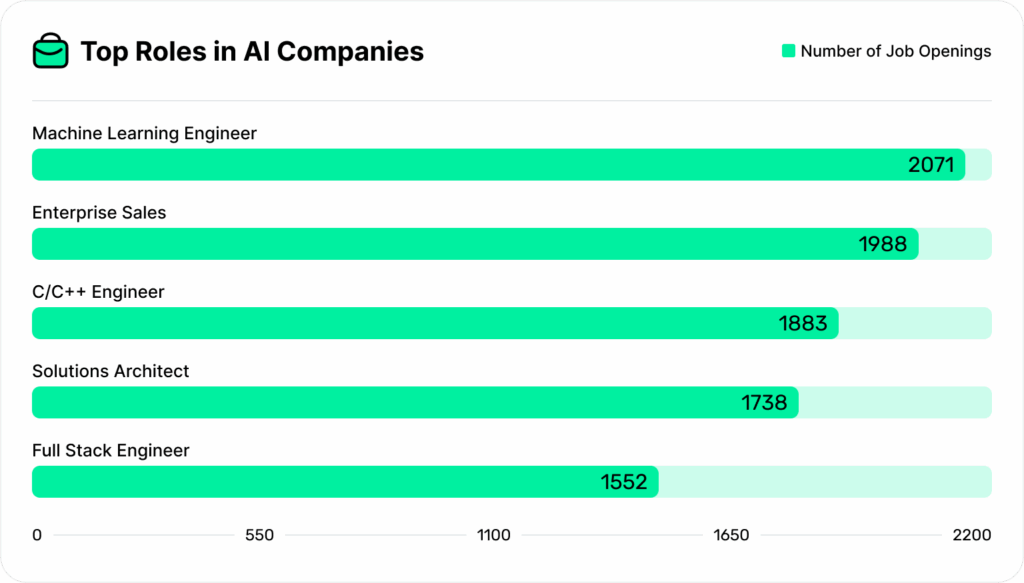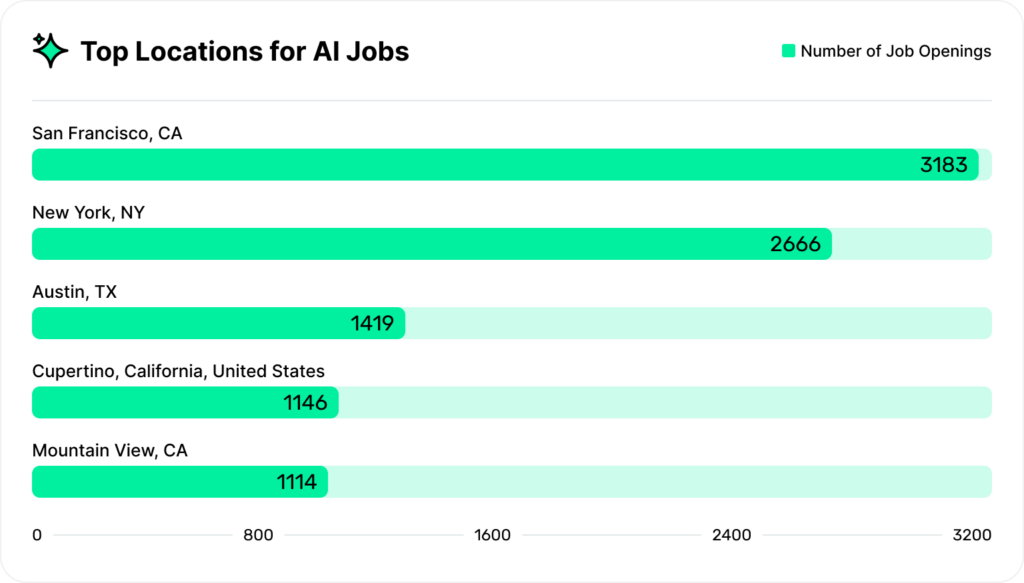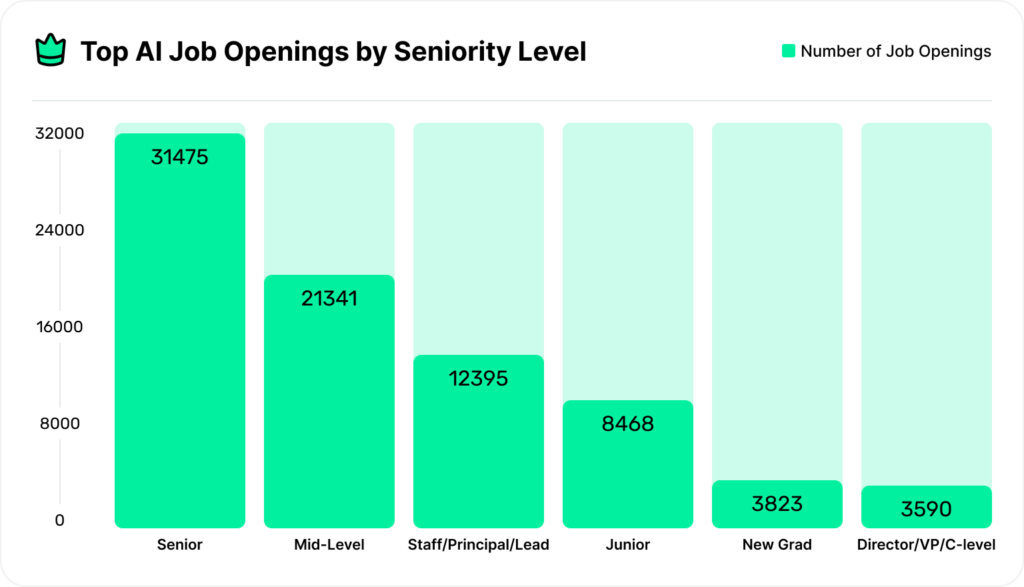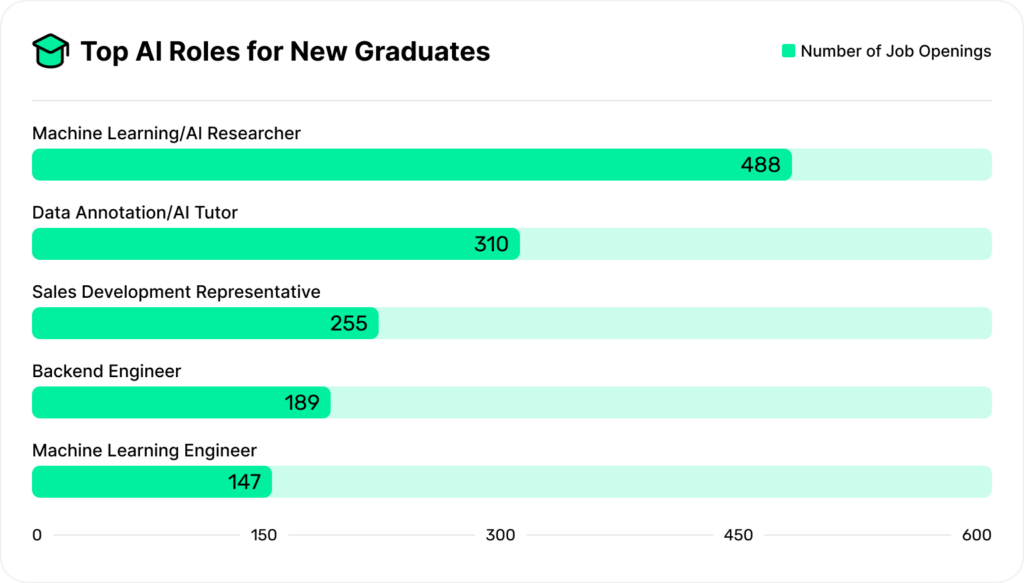Inside the AI Hiring Boom: What Top AI Companies Are Looking For in 2025
As the AI revolution accelerates, so too does the race to build world-class teams. Companies like OpenAI, Anthropic, Perplexity, and others are not just shipping groundbreaking models—they’re hiring aggressively to fuel what comes next in the AI race.
As these companies become pillar technology companies for the next decade, they’re also redefining what the technology jobs of the future look like.
Jobright’s latest data offers a revealing snapshot into how the AI industry is evolving, what roles are most in demand, and what this means for both job seekers and companies. The data captures current job postings from private AI companies(as defined by Crunchbase).
1. The AI Power Duo: Machine Learning Engineers and Enterprise Sales

While it’s no surprise that Machine Learning (ML) Engineers top the list (2,071 openings), what’s striking is how close Enterprise Sales roles are behind (1,988 openings). These two roles highlight the dual priorities of AI companies: technical excellence and go-to-market execution.
The latter indeed points to a growing demand by enterprises for the latest AI solutions. Even legacy enterprise technology companies are radically scaling their sales teams to sell their new AI solutions. For instance, Salesforce made news at the end of 2024, when Marc Benioff announced it was hiring for 2,000 new enterprise sales positions to exclusively sell AI solutions.
The biggest AI companies are not far behind in ramping up their enterprise sales processes. While the vast majority of the $4B in revenue that OpenAI made in 2024 came from consumer sales, it is already making inroads in enterprise sales with big-name corporate customers such as biotech firm Moderna and Lowe’s, the national home improvement retailer. To do that, OpenAI has scaled the number of enterprise sales personnel from 200 in June of last year to 300 by the end of 2024, which now accounts for more than 20% of OpenAI’s total staff.
What is interesting about ML Engineers being the most widely sought-after role to fill right now is that the role barely existed within the technology sector when you go back 5-7 years. It probably wasn’t until 2018 that the role became more common at public FAANG companies. However, with the generative AI explosion in 2023, this role has become extremely important at AI companies and technology companies more broadly. ML engineers now often break into specializations such as LLM fine-tuning, inference optimization, and retrieval-augmented generation (RAG) AI infrastructure. MLEs are typically responsible for furthering the development of AI-powered products for consumer and business use, not just internal tools.
With overall software development and engineering job postings down by 35% since 2020, according to Indeed, it will be interesting to see how engineering job openings at AI companies evolve over time. Outside of ML Engineers, engineering openings made up the other five top current job postings at AI companies, with C/C++ Engineers (1,883 openings), Solutions Architects (1,738), and Full Stack Engineers (1,552) rounding out the list.
2. San Francisco and New York City Reign Supreme

AI companies may be remote-friendly, but when it comes to sheer volume of openings, San Francisco (3,183 jobs) and New York City (2,666 jobs) still dominate.
The geographic findings are pretty similar to estimates from UMD-LinkUp AI Maps on AI jobs in general at all companies. That data finds that New York, Seattle, San Jose, and San Francisco are the top overall markets for AI jobs.
Jobright data found that the current top areas listing job openings at AI companies also included Austin, Cupertino, and Mountain View, with each having more than 1,000 open roles listed.
Austin might be especially interesting to watch as a hotbed for jobs at AI companies, as Elon Musk’s xAI startup officially acquired X in March, which has offices in the greater Austin area (Bastrop, Texas).
3. Experience Matters: 85% of Roles Target Mid-to-Senior Talent

AI companies are scaling fast, but they’re not taking shortcuts when it comes to hiring. A full 85% of open roles are for mid-level, senior, staff, or leadership positions.
Breaking down further, Jobright found there were 31,475 open roles listed for senior-level talent and 21,341 roles listed for mid-level talent. Junior and new-grad targeted listings only made up 15% of all job postings.
These are genuinely the AI talent wars, with later-stage, well-backed AI startups willing to offer stock grants between $2-$4M for top senior talent as they compete with big tech companies such as Facebook, Google, Amazon, and Apple. Furthermore, VC firms are increasingly being brought in to assist AI startups with recruiting in the form of networking and building a robust talent pipeline.
4. For New Grads, It’s About More Than Software Engineering

Entry-level roles in AI are highly specialized, with openings for ML/AI Researchers (488 openings) leading the way. These roles focus on cutting-edge model development, optimization (quantization, pruning, hardware acceleration), and real-time AI systems, leveraging deep learning frameworks like TensorFlow and PyTorch.
Next up was AI Tutor / Data Annotator roles (310). These roles play a critical role in improving AI models by evaluating AI-generated content, designing training data (including coding tasks and scenarios), and ensuring high-quality, accurate data that directly impacts AI models.
Sales Development Representative (255) and Backend Engineer (189) roles round out the top four entry-level positions available at top private AI companies. SDRs in AI companies need a solid understanding of AI products and trends to effectively communicate complex AI solutions and leverage AI-powered sales tools for prospecting and lead qualification.
The data illustrates that run-of-the-mill entry-level jobs don’t exist to get your foot in the door at rapidly scaling AI startups. Upcoming graduates will need to display the expertise that they’ve put to use in their schooling and in their internship roles previously.
What This Means for You
For job seekers:
- Technical candidates should look beyond just ML—ML-annotation, backend, infra, and optimization roles are booming.
- Sales talent with AI literacy is in rare supply and high demand.
- New grads can break in through research, tutoring, and SDR pathways—all roles that combine learning with impact.
For AI companies:
- Benchmark your hiring roadmap: if you’re not investing in human-in-the-loop systems or go-to-market talent, you may fall behind.
- Don’t underestimate the demand for experienced hires—mid and senior roles are where the real war for talent is playing out.
The takeaway? The AI job market in 2025 is fast-moving, specialized, and packed with opportunity. Whether you’re building, selling, or supporting the next generation of AI, there’s never been a better time to get in the game.
